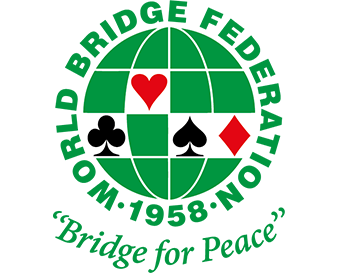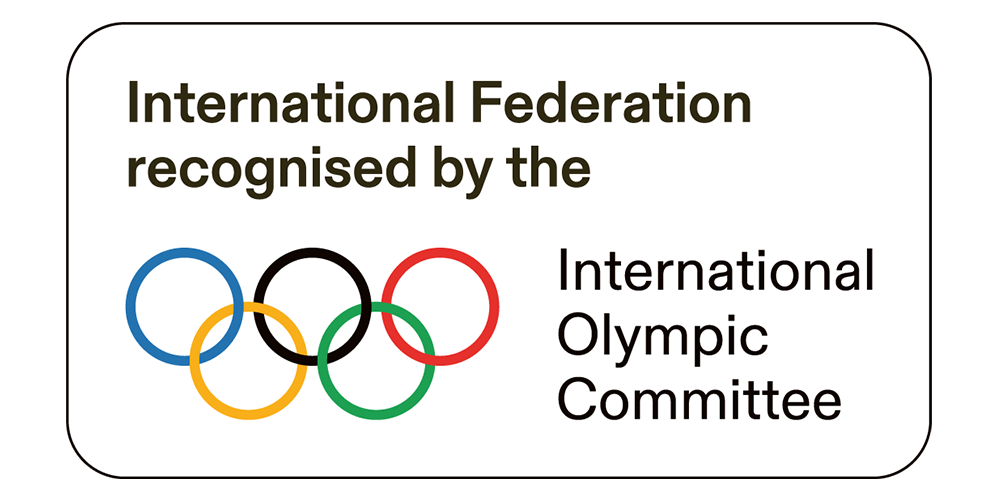- Home
- Competitions
- The wbf championships
- The world bridge games
- The torlontano trophy – the women’s teams
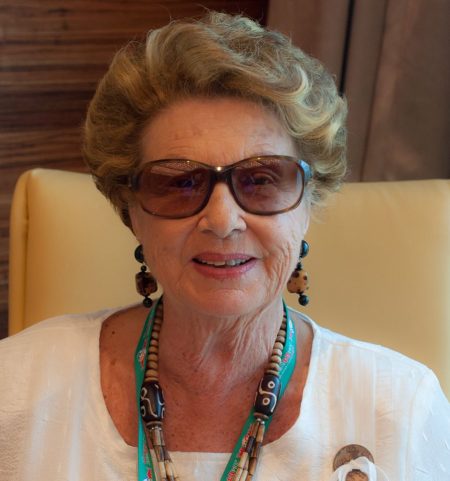
The World Bridge Teams Olympiad, today the World Bridge Games, inaugurated in Turin, Italy in 1960 was the first competition to be set up by the WBF itself, the Bermuda Bowl already being well established when the WBF was founded in 1958. Harold S. Vanderbilt, the inventor of modern bridge scoring, endowed the new event with a handsome cup, the Vanderbilt Trophy.
Starting from the 16th edition of the World Bridge Games in 2020, the trophy will take the name of Anna Maria Torlontano to honour her memory in recognition of her unselfish effort in making a significant contribution to the enhancement and growth of the women bridge throughout the world.
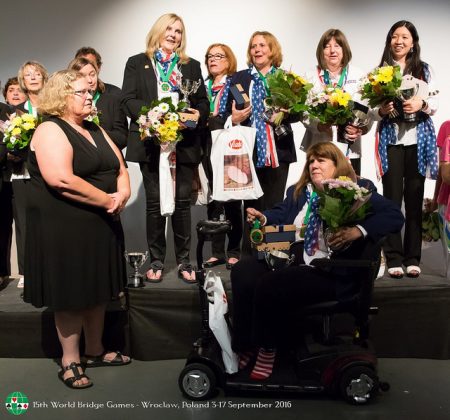 35 Women Teams attended the 15th edition of the World Bridge Games in Wroclaw, Poland.
35 Women Teams attended the 15th edition of the World Bridge Games in Wroclaw, Poland.
The American women also played France, winners over USA last year in the Venice Cup in Chennai, India. USA won the first set 60- 12 and never looked back in winning the rematch 254-180.
1.USA: Lynn Deas, Beth Palmer, Kerri Sanborn, Janice Seamon-Molson, Sylvia Shi, Tobi Sokolow, David Sokolow (npc)
2.France: Bénédicte Cronier, Catherine D’Ovidio, Nathalie Frey,Vanessa Reess, Sylvie Willard, Joanna Żochowska, Laurent Thuillez (npc)
3.China: Huang Yan, Liu Yan, Lu Yan, Shen Qi,Wang Nan,Wang Wenfei,Wang Jianxin (npc), Wang Xiaojing (coach)
To check all the information of this championship, please click here.
Women’s Teams:
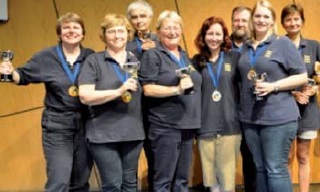 1. ENGLAND: Sally Brock, Fiona Brown, Heather Dhondy, Nevena Senior, Nicola Smith, Susan Stockdale, Jeremy Dhondy (NPC), David Burn (Coach).
1. ENGLAND: Sally Brock, Fiona Brown, Heather Dhondy, Nevena Senior, Nicola Smith, Susan Stockdale, Jeremy Dhondy (NPC), David Burn (Coach).
2. RUSSIA: Svetlana Chubarova, Victoria Gromova, Anna Gulevich, Elena Khonicheva, Tatiana Ponomareva, Olga Vorobeychikova.
3. POLAND: Cathy Baldysz, Eva Banaszkiewicz, Katarzyna Dufrat, Danuta Kazmucha, Natalia Sakowska, Justyna Zmuda, Miroslaw Cichocki (NPC), Cezary Serek (Coach).
To check all the information of this championship, please click here.
Women’s Teams:
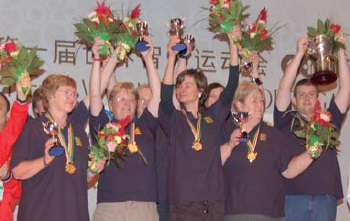 1. ENGLAND: Heather Dhondy, Catherine Draper, Sally Horton, Anne Rosen, Nevena Senior, Nicola Smith, Martin Jones (NPC), Sandra Penfold (Coach).
1. ENGLAND: Heather Dhondy, Catherine Draper, Sally Horton, Anne Rosen, Nevena Senior, Nicola Smith, Martin Jones (NPC), Sandra Penfold (Coach).
2. CHINA: Gu Ling, Liu Yi Qian, Sun Ming, Wang Hongli, Wang Wenfei, Zhang Yalan, Ju Chuan Cheng (NPC), Lin Ya Fu (Coach).
3. USA: Mildred Breed, Marinesa Letizia, Sylvia Moss, Judi Radin Janice Seamon-Molson, Tobi Sokolow, Sue Picus (NPC), Eric Kokish (Coach).
After the 29th Summer Olympic Games in August and the 13th Paralympics that followed in September, China was not yet finished playing host to the rest of the world in 2008: at the beginning of October the stage was set for the first edition of the World Mind Sports Games (WMSG), a gathering of some 3000 people from over 140 countries and regions competing in one of five disciplines: Bridge, Chess, Go, Xianqi (Chinese Chess) and Draughts. Media coverage, perhaps building on the standards established at the Olympics and Paralympics, was extensive, with nightly Chinese TV broadcasts and daily newspaper reports. The World Bridge Teams Olympiad assumed its new name of World Bridge Games and was incorporated in the World Mind Sport Games. With approximately 2,000 players from 92 countries participating, Bridge was the main event at the WMSG. The Open and Women’s events commenced with six days of round robin competition (16-board matches, IMPS converted to VP) in seeded groups of 16-18 teams to qualify 16 teams for the knockout stage. The 71 teams in the Open series (one short of a perfect 72) were seeded into four groups, each producing four teams for the Round of 16, the winner of each group earning the privilege of choosing its opponent from the third- and fourth place finishers in its companion group (A with B; C with D). Once those selections were made, the rest of the draw was completed in accordance with a pre-determined formula, so winning the group was, at least in theory, a significantadvantage. In the 96 board final a highscoring first set gave Italy a 16-IMP lead, but the second set was much more dynamic: Italy won it 46-4 to lead by 58 one-third of the way through the match. The young English team fought back with two good sets of their own to cut the deficit to 20 with 32 to play. Italy gained 15 IMPs in Segment 5, and conceded only 5 IMPs over the final 16 boards to win the first WBG Open Teams under the WMSG umbrella, effectively defending the Olympiad Open Team title earned in Istanbul in 2004. The final margin in the well played final was 30 IMPs. This gave Italy its sixth title in this competition, increasing its impressive record. Norway added the bronze to its remarkable collection of medals. In the Women’s event, the final was a match that will be discussed for years. Who knows how great the pressure was on the Chinese women to win the World Championship on their home turf, with the greatest national media coverage the sport had ever received? But in the end England won by 1 IMP! 32 teams entered the Seniors and were seeded into two groups of 16, with half the teams in each round robin group qualifying for the knockouts. The field was very strong at the top. So many matches were like “A Tale of Two Cities” with shades of ‘the best of times’ and the ‘worst of times’. Take this one, for example, in which highly fancied USA came out of the chute like a bull bent on wiping out anyone unfortunate enough to get in its way. The Americans won the first set 60-28 and tacked on 4 and 7 IMPs in the next two to lead by 43 at the end of the first day of play.
But the new day brought a dramatic change of momentum: Japan won Sets 4 and 5 by identical 44-12 scores to take a 21-IMP lead into the final stanza.
To check all the information of this championship, please click here.
Women’s Teams:
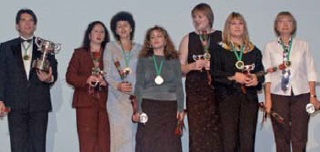 1. RUSSIA: Olga Galaktionova, Victoria Gromova, Natalia Karpenko, Maria Lebedeva, Tatiana Ponomareva, Irina Vasilkova, Alexey Efremov (NPC).
1. RUSSIA: Olga Galaktionova, Victoria Gromova, Natalia Karpenko, Maria Lebedeva, Tatiana Ponomareva, Irina Vasilkova, Alexey Efremov (NPC).
2. USA: Marinesa Letizia, Jill Meyers, Randi Montin, Janice Seamon-Molson, Tobi Sokolow, Carlyn Steiner, Jill Levin NPC), Jan Martel (Coach).
3. ENGLAND: Michelle Brunner, Heather Dhondy, Rhona Goldenfield, Sally Horton, Nicola Smith, Kitty Teltscher, Alan Mould (NPC), Christine Duckworth (Coach).
The 12th Bridge Olympiad was staged in Turkey, and despite some forebodings over the choice of venue, resulted in one of the most successful such events ever held. The Open Series once again had 72 competing teams, and the Women’s series saw 43 teams participating.
As before, the Open Teams were divided into four sections and the Women’s teams into two sections, playing a complete round robin to determine the teams to go through to the Knock Out phase. Italy took the Open title once again, defeating The Netherlands in the Final. Russia defeated China in the play-off to take the Bronze Medal. Winning the World Bridge Games created two new Italian Grand Masters – Fulvio Fantoni & Claudio Nunes. In the Women’s series, the surprise of the Championship came when a young Russian team took the Gold Medal defeating the experienced USA team. England took the Bronze Medal, defeating China in the playoff. In the Seniors Teams the entries increased with 29 teams taking part. USA again took the title, although with a completely different team.
To check all the information of this championship, please click here.
Women’s Teams:
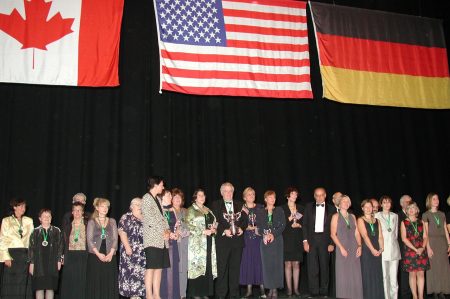
The Medal winners
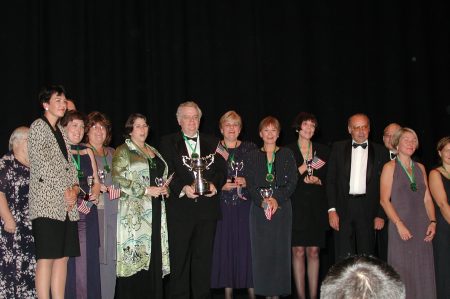
Team USA
1. USA: Mildred Breed, Petra Hamman, Joan Jackson, Robin Klar, Shawn Quinn, Peggy Sutherlin, Robert Hamman (NPC).
2. CANADA: Francine Cimon, Dianna Gordon, Rhoda Habert, Beverly Kraft, Martin Lacroix, Catherine Kathie Thorpe, Jim Green (NPC).
3. GERMANY: Daniela von Arnim, Sabine Auken, Katrin Farwig, Barbara Stawowy, Beate (Pony) Nehmert, Andrea Rauscheid-Reim, Christoph Kemmer (NPC).
The 11th Bridge Olympiad was held in Maastricht, the Netherlands, 40 years after the first Bridge Olympiad in 1960. Another record was achieved in the Open Series, where there were 72 competing teams divided into four sections each playing a complete round-robin. For the first time the knockout phase started with a round of 32, followed by quarter-finals, semi-finals and the final.
40 teams competed in the Women’s series, being divided into two groups for the Round-robin, which again determined the teams to enter the round of 32. In the closely fought Open teams final, Italy defeated Poland by 269-249 to take, after 28 years, its fourth gold Olympic medal. For the second time in the history of the Olympiad, this was to be the first of three successive Olympiad victories gained by Italy. For the first time, the three countries of England, Scotland and Wales competed under their own flags instead of as Great Britain, with England reaching the bronze-medal play-off where they lost to USA.
In the Women’s Series, the USA team defeated Canada by 176-144, while Germany took the bronze medal in a play-off against Norway.
The World Seniors International Cup was introduced for the first time in Maastricht, alongside the World Teams Olympiad, took place.
24 National Senior Teams participated, and the Cup was won by the USA team. Robert Wolff was a member of the winning team and by doing so became the only player ever to win World Championships in five different events.
To check all the information of this championship, please click here.
Women’s Teams:
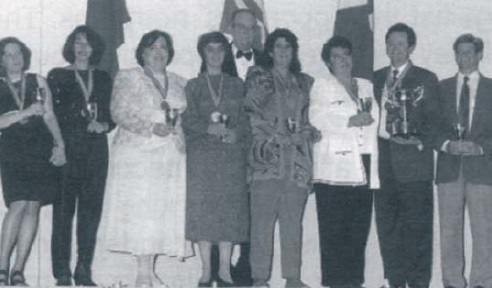 1. USA: Jillian Blanchard, Juanita Chambers, Lynn Deas, Gail Moss Greenberg, Irina Levitina, Shawn Quinn, Eddie Wold (NPC).
1. USA: Jillian Blanchard, Juanita Chambers, Lynn Deas, Gail Moss Greenberg, Irina Levitina, Shawn Quinn, Eddie Wold (NPC).
2. CHINA: Gu Ling, Sun Ming, Wang Hongli, Wang Wenfei, Zhang Yalan, Zhang Yu, Zhang Wei Li (NPC).
3. CANADA: Francine Cimon, Dianna Gordon, Rhoda Habert, Beverly Kraft, Sharyn Reus, Barbara Saltsman.
The 10th Bridge Olympiad was played in Rhodes, Greece.
Celebrating the 100th anniversary of the Olympic Games, the World Bridge Games registered a record participation with 71 Open Teams and 44 Women’s in two series. The fields in both series were divided into two sections, playing a complete round-robin within each section to decide the quarter finalists. The Open Series played four 16-board matches each day, the Women’s series three 20- board matches. In the Open final, France retained the Trophy, beating Indonesia by 358- 269. Only two members of the 1992 team, Alain Levy and Hervé Mouiel played. The bronze medal went to Denmark. In the Women’s final, the USA team beat China by 268-198 with Canada taking the Bronze Medal.
To check all results of this championship, please click here.
Women’s Teams:
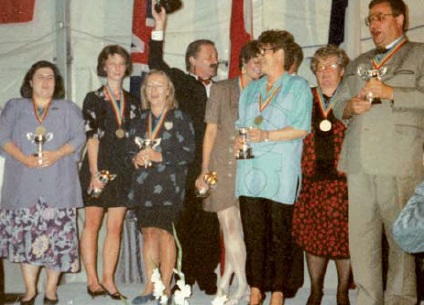 1. AUSTRIA: Maria Erhart, Doris Fischer, Herta Gyimesi, Barbara Lindinger, Jovanka Smederevac, Terry Weigkricht, Ernst Pichler (NPC).
1. AUSTRIA: Maria Erhart, Doris Fischer, Herta Gyimesi, Barbara Lindinger, Jovanka Smederevac, Terry Weigkricht, Ernst Pichler (NPC).
2. GREAT BRITAIN: Pat Davies, Michele Handley, Sandra Landy, Elizabeth (Liz) McGowan, Sandra Penfold, Nicola Smith, Mark Horton (NPC).
3. FRANCE: Danielle Avon, Veronique Bessis, Elisabeth Delor, Anne Claude De L’Epine, Sylvie Willard, Philippe Cronier (NPC).
The 9th NEC Inter-Nations World Bridge Teams Olympiad was also played in Italy, but this time at Salsomaggiore Terme. This event, scheduled initially in Brazil was moved just a few months beforehand to Salsomaggiore Terme in what can only be described as very successful organization by the Italian Federation and its President, Gianarrigo Rona, under the guidance of the WBF President Ernesto d’Orsi. The 57 teams in the Open Championship were divided into two groups for the round-robin, with the leading four teams from each qualifying for the knockout stages. In the final France beat the USA 251-171. The runners-up were the same as the team that won in 1988, except that Michael Rosenberg replaced the late Jim Jacoby. The Netherlands took the bronze medal. The 34 teams that contested the Women’s series were also divided into two groups but they played a double roundrobin.
In the final, Austria beat Great Britain 266-218. France took the bronze medal.
Norway won the WBF Swiss Plate.
Women’s Teams:
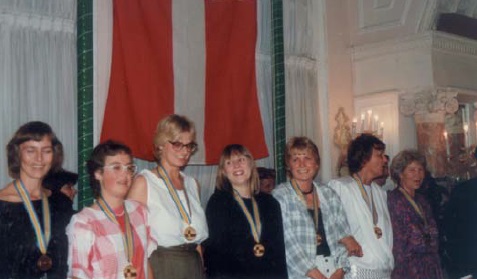 1. DENMARK: Trine Dahl, Bettina Kalkerup, Kirsten Møller, Judy Norris, Charlotte Palmund, Dorthe Schaltz, Inger Lindegaard (NPC).
1. DENMARK: Trine Dahl, Bettina Kalkerup, Kirsten Møller, Judy Norris, Charlotte Palmund, Dorthe Schaltz, Inger Lindegaard (NPC).
2. GREAT BRITAIN: Michelle Brunner, Pat Davies, Sandra Landy, Elizabeth (Liz) McGowan, Sandra Penfold, Nicola Smith, Grattan Endicott (NPC).
3. BULGARIA: Maria Garvalova, Margarita Halatcheva, Steliana Ivanova, Albena Krasteva, Matilda Popilov, Nevena Senior (formally Deleva), Christo Drumev (NPC).
The 8th Bridge Olympiad was held in Venice, Italy, which hosted the event in a memorable way, which is still regarded as one of the best in the history of the bridge championships.
In the Open USA won this competition for the first time from a field of 57 teams, divided into two groups, each of which qualified four teams for the quarter-finals. In these USA beat Denmark, India beat Greece, Austria beat Great Britain, and Sweden beat Italy. In the semi-finals, the USA beat India and Austria beat Sweden. The USA led throughout the final to win by 289.7 IMPs to 247.
The Women’s Series was split into three, again qualifying eight teams to the knockout phase. Denmark defeated Great Britain by 178-157 IMPs in an exciting final.
Women’s Teams:
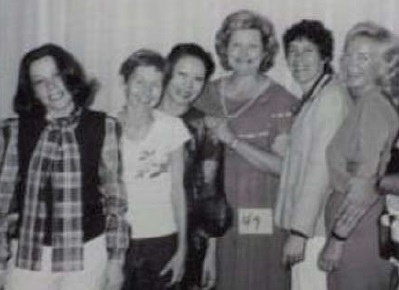 1. USA: Betty Ann Kennedy, Jacqui Mitchell, Gail Moss, Judi Radin, Carol Sanders, Kathie Wei, Jim Zimmerman (NPC).
1. USA: Betty Ann Kennedy, Jacqui Mitchell, Gail Moss, Judi Radin, Carol Sanders, Kathie Wei, Jim Zimmerman (NPC).
2. GREAT BRITAIN: Pat Davies, Sally Horton, Sandra Landy, Sarah Scarborough, Gillian Scott-Jones, Nicola Smith, Hugh Kelsey (NPC).
The 7th Bridge Olympiad was held in Seattle, State of Washington, USA. The Open was won by Poland from a field of 54, divided into two groups, each of which qualified four teams for the quarterfinals. In these Poland beat Pakistan; France beat Indonesia; Denmark beat Italy and Austria beat the USA. In the semi-finals France beat Denmark 164-149 and Poland beat Austria 147-143. Poland led throughout the final to win by 236 IMPs to 156. The Women’s Series played a complete round-robin, also of 20-board matches. The final was won narrowly by USA They defeated Great Britain by 109 1/2 IMPs to 99, having started with a carryover of 22 1/2. The losing semi-finalists were France and the Netherlands. 1984 also saw a new competition, the WBF Swiss Plate, for teams that failed to make the semi-finals. New alignments were permitted as long as all the players were from the same country and had competed in either the Open or Women’s Series as players or non playing captains.
The winners were Sweden.
Women’s Teams:
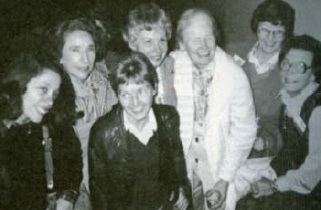 1. USA: Mary Jane Farell, Emma Jean Hawes, Dorothy Hayden Truscott, Marilyn Johnson, Jacqui Mitchell, Gail Moss, Ruth McConnell (NPC).
1. USA: Mary Jane Farell, Emma Jean Hawes, Dorothy Hayden Truscott, Marilyn Johnson, Jacqui Mitchell, Gail Moss, Ruth McConnell (NPC).
2. ITALY: Marisa Bianchi, Luciana Capodanno, Marisa Baffi D’Andrea, Enrichetta Gut, Andreina Martinelli Morini, Anna Valenti, Anna Maria Torlontano (NPC).
3. GREAT BRITAIN: Michelle Brunner, Pat Davies, Sally Horton (formally Sowter), Sandra Landy, Rita Oldroyd, Nicola Smith, Raymond Brock (NPC).
The 6th Bridge Olympiad, held in Valkenburg, Netherlands, surpassed all previous attendance records – there were 58 Open teams and half that number of Women’s teams. A single round-robin was now impractical and the Open field had to be divided into two groups of comparable strength and geographical representation. This was hard to achieve and the task was made more difficult by the inability, due to government intervention, of a number of teams to play against South Africa. Each of the two groups played a round-robin of 20-board matches. Four teams emerged from each group to contest the semi-finals, again on a round-robin basis, the first and fourth placed teams from one group and the second and third placed teams from the other group being matched.
In each semi-final, 32-board matches were played. The finalists proved to be France and USA, France winning the 88-board encounter by 131 IMPs to 111. This performance by France was outstanding, the team losing only one match during the two-weeklong event – to Chinese Taipei, in the semifinals round-robin. Thus the Vanderbilt Trophy returned to France after an interval of 20 years. The Women’s Series, a straight round-robin, was comfortably won by the USA ahead of Italy and Great Britain. USA lost only four of their 28 matches – three of these by a margin of only 11 victory points to 9!
Women’s Teams:
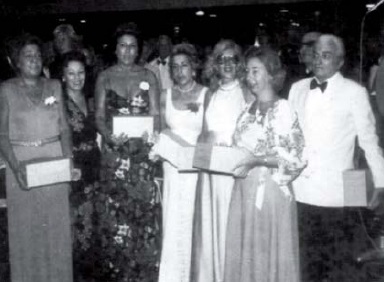 1. ITALY: Marisa Bianchi, Luciana Capodanno, Marisa Baffi D’Andrea, Rina Jabes, Antonietta Robaudo, Anna Valenti, Giovanni Pelucchi (NPC).
1. ITALY: Marisa Bianchi, Luciana Capodanno, Marisa Baffi D’Andrea, Rina Jabes, Antonietta Robaudo, Anna Valenti, Giovanni Pelucchi (NPC).
2. GREAT BRITAIN: Charley Esterson, Fritzi Gordon, Sandra Landy, Rixi Markus, Rita Oldroyd, Nicola Smith (formally Gardener), Graham Cooke (NPC).
3. USA: Mary Jane Farell, Emma Jean Hawes, Dorothy Hayden Truscott, Marilyn Johnson, Jacqui Mitchell, Gail Moss, Margaret Wagar (NPC).
The 5th Bridge Olympiad was held in Monte Carlo along with the 22nd Bermuda Bowl – the first and only occasion when both were staged in the same year. The double event was needed to bring the timing right for a new scheduling of WBF competitions. The 1976 format was a straight round-robin of 16-board matches between 45 competing nations: there were no semi-finals or final. The last round was dramatic:
Italy, who had seemed almost home, lost unexpectedly to Greece 17-3; whilst Brazil, who had seemed headed for fourth place, scored a surprise ‘blitz’ over Canada, bringing them to the top of the table, Italy was second, with Great Britain third and Poland fourth. Thus the Vanderbilt Trophy went to the Western Hemisphere for the first time, whilst Brazil became the first NBO outside Zones 1 and 2 to win an Open Teams Championship. At the same time, Poland became the first nation from Eastern Europe to achieve prominence in any WBF event. In the Women’s Series, Italy retained their crown, finishing ahead of Great Britain and the USA in the 21-nation field.
Women’s Teams:
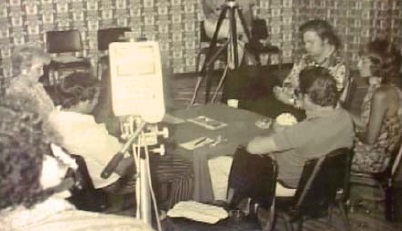 1. ITALY: Marisa Bianchi, Rina Jabes, Maria Antonietta Robaudo, Luciana Canessa Romanelli, Anna Valenti, Maria Vittoria Venturini, Giovanni Pelucchi (NPC).
1. ITALY: Marisa Bianchi, Rina Jabes, Maria Antonietta Robaudo, Luciana Canessa Romanelli, Anna Valenti, Maria Vittoria Venturini, Giovanni Pelucchi (NPC).
2. SOUTH AFRICA: Thelma Beron, Janie Disler, Gerda Goslar, Rita Jacobson, Petra Mansell, Elfreda Sender, Alma Shnieder, Ralph Mizroch (NPC).
3. USA: Mary Jane Farell, Emma Jean Hawes, Dorothy Hayden, Marilyn Johnson, Jacqui Mitchell, Peggy Solomon, Margaret Wagar (NPC).
The 4th Bridge Olympiad was held at Miami Beach, Florida USA, with an Open field grown to 39.
By doing without free days it proved possible to maintain the length of the round-robin matches at 20-boards, with 64-board semi-finals and an 88-board final. For the first time, boards were duplicated across the field, including the Women’s matches – a popular innovation.
The Open was won by Italy again with the same team (which won also four consecutive Bermuda Bowls in 1965, 1966, 1967 and 1969), but once again with a different NPC, Umberto Barsotti.
The USA were second, Canada third and France fourth. The Women’s Series, playing a straight round-robin, was also won by Italy with South Africa second and USA third of 18 contestants. Italy is the only country to have won both the titles in the same year.
Women’s Teams:
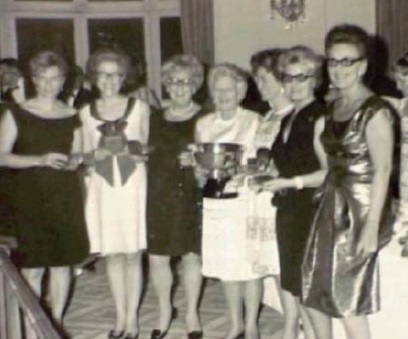 1. SWEDEN: Britt Blom, Karin Eriksson, Eva Martensson, Rut Segander, Gunborg Silborn, Britta Werner, Lotty Saaby-Christiansen (NPC).
1. SWEDEN: Britt Blom, Karin Eriksson, Eva Martensson, Rut Segander, Gunborg Silborn, Britta Werner, Lotty Saaby-Christiansen (NPC).
2. SOUTH AFRICA: Thelma Beron, Gerda Goslar, Rita Jacobson, Petra Mansell, Elfreda Sender, Alma Shnieder, Ralph Mizroch (NPC).
3. USA: Hermine Baron, Nancy Gruver, Emma Jean Hawes, Sue Sachs, Dorothy Hayden, Rhoda Walsh, Margaret Wagar (NPC).
The 3rd Bridge Olympiad was held at Deauville, France, with 33 Open teams playing a format similar to that of 1964, but with round-robin matches of 20 boards and semi-finals and final of 80 boards. The event was won by Italy with the same Team as four years earlier, but with Angelo Trancanella as NPC.
Runners-up were the USA, with Canada third and the Netherlands fourth. The 19-team Women’s Series was won by Sweden with South Africa second and USA third.
Women’s Teams:
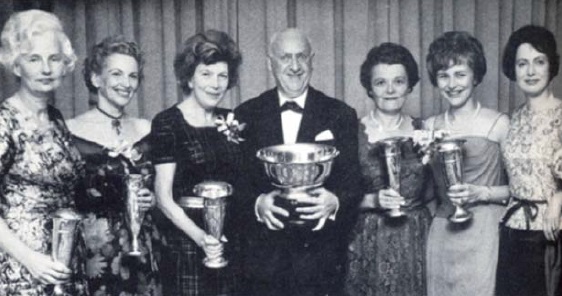 1. GREAT BRITAIN: Dimmie Fleming, Fritzi Gordon, Jane Juan, Rixi Markus, Mary Moss, Dorothy Shanahan, Harold Franklin (NPC).
1. GREAT BRITAIN: Dimmie Fleming, Fritzi Gordon, Jane Juan, Rixi Markus, Mary Moss, Dorothy Shanahan, Harold Franklin (NPC).
2. USA: Agnes Gordon, Muriel Kaplan, Alicia Kemper, Helen Portugal, Stella Rebner, Jan Stone, Paul Hodge (NPC).
3. FRANCE: Suzanne Baldon, Annie Chanfrai, Marguerite De Gailhard, Genevieve Morenas, Marianne Serf, Jose Le Dentu (NPC).
Following the inaugural event, the Bridge Olympiad became a competition for one Open team and one Women’s team from each NBO. In 1964 it was held in New York, USA, with 29 teams in the Open and 15 in the Women’s Series. The Open consisted of a round-robin of 18-board matches, with the leading four teams qualifying for a 60- board semi-final and a 60-board final. The Open series was won by Italy. Runners-up were the USA, with Great Britain third and Canada fourth. This was the first of three successive Olympiad victories gained by Italy. The Women’s series was a straight round-robin of 36-board matches, won comfortably by Great Britain.
Women’s Teams:
1. UNITED ARAB REPUBLIC: Helen Camara, Aida Choucry, Samiha Fathy, Loula Gordon, Josephine Morcos, Suzanne Naguib, Sergio de Polo (NPC).
2. FRANCE: Mrs. Alexandre, Annie Chanfray, Mrs. Gary, Genevieve Morenas, Esmerian Pouldjian, Mrs. Rouviere, Rene Huni (NPC).
3. DENMARK: Oth Dam, Annelise Faber, Rigmor Fraenckel, Lizzie Schaltz, Gulle Skotte, Sven Halvorsen (NPC).
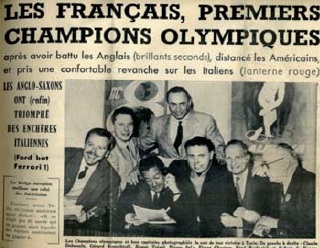 This first Bridge Olympiad was held in Turin, Italy, and was contested by 25 countries.
This first Bridge Olympiad was held in Turin, Italy, and was contested by 25 countries.
In the Open Series there were actually 29 teams because – on this occasion only – a concession was made to NBOs with large memberships, the USA being allowed to enter four teams and Sweden two. In the Women’s Series 14 NBOs were represented, each by one team.
Competing were, Australia (W), Austria (W), Belgium (W), Brazil, Canada, Chile, Denmark (W), Finland, France (W), Germany (W), Great Britain (W), Netherlands (W), Iceland, India, Ireland (W), Italy (W), Lebanon, Philippines (W), South Africa, Spain, Sweden, Switzerland (W), United Arab Republic (W), USA (W), Venezuela. The Open field was divided into three groups, leading to a six-team final. This was won narrowly by France from Great Britain. The Women’s Series, a straight round-robin, was won by an Egyptian team representing the United Arab Republic, who beat France narrowly – the two teams finished level on victory points, UAR taking the crown on IMP quotient.
